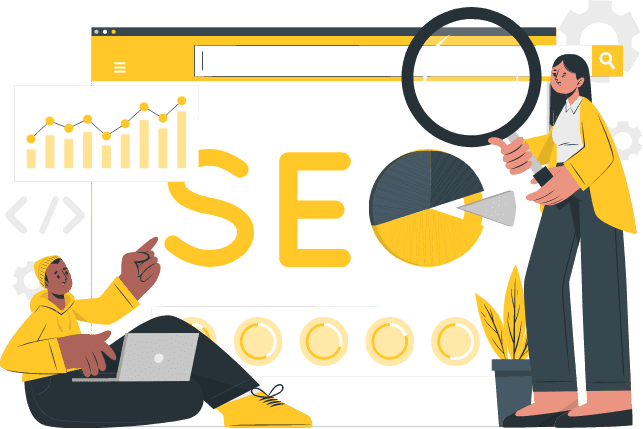
- Nov 30, 2021
How Does SEO Help eCommerce?
SEO is a critical requirement for all e-commerce websites today.
- First, your products need to rank higher than your competitors.
- Second, those products must be displayed in the right way to entice potential buyers.
- Third, you need to ensure that your potential customers find the products that they search for in the SERPs and click on your site.
Why does SEO matter for eCommerce?
It is needless to say that a big chunk of the world today shops online. That being said, each year, online shopping is getting bigger. With the COVID-19 pandemic, more and more consumers are prioritizing online to buy everything from luxury items to groceries. According to Statista, a German database company specializing in market and consumer data, by the end of 2021, there will be a whopping 2.14 billion global online buyers. Another study conducted by SEMrush shows that 38% of retailer traffic comes from organic search. E-commerce SEO, in this aspect, is a great tool to get the most out of your online business, increasing your sales. It can increase your organic search traffic helping your eCommerce site rank higher in search engines. Both at home and on the go, so many users use Google to make their purchasing decisions. Hence, it’s a necessity to have a search engine optimized website and product pages. Otherwise, you basically lose access to qualified and interested eCommerce customers since your product doesn't show in the SERPs for not taking the help of eCommerce SEO services.
Both at home and on the go, so many users use Google to make their purchasing decisions. Hence, it’s a necessity to have a search engine optimized website and product pages. Otherwise, you basically lose access to qualified and interested eCommerce customers since your product doesn't show in the SERPs for not taking the help of eCommerce SEO services.
A list of top eCommerce SEO services to think about
In our technical SEO inspections, we go through more than 250 recommendations. However, here’s a small list of eCommerce SEO services that you should consider.-
- Technical SEO Services
- Conducting Detailed SEO Audits
- On-Page SEO Implementation
- Schema Implementation
- Conversion Rate Optimization
- Link Building Services
- Off-Page SEO Implementation
Steps to improving your eCommerce SEO strategy
Use these strategies to improve your eCommerce SEO strategy and achieve greater search rankings, site traffic, brand exposure, and conversion:
- Reduce load time
- Optimize for mobile
- Resolve site errors
- Enable canonical tags
- Add customer reviews
- Breadcrumbs are good
- Content optimization is required
- Site search optimization
- Track your SEO
Best practices for eCommerce SEO
Now let’s take a look at some of the best SEO strategies for eCommerce sites that aren't performing well. You'll need an eCommerce SEO strategy if you want customers to find your products more easily. And crossing the below-mentioned points off your list will make your strategy more effective.Use important keywords
Make sure that your product information is appealing to consumers and search engines by making it simple for them to understand, find, and use. If you have visitors from many locations, consider including measurements in standard, metric, or both. To ensure that product pictures or photos are right the size and color, compare them to real things.Design with shoppers in mind
It is vital that your website and product page design add to, rather than detract from, the customer's purchasing experience. Even if you have the greatest, most wanted items in your field at the best pricing available, a buyer will become frustrated and go away from your site if they find it challenging to navigate or search.
Avoid cluttered, complicated URLs
A URL is an address by which a website visitor accesses a page on your eCommerce store. URLs may contain a lot of data in a little space. All possible components are categories, products, file types, and even behaviors (such as "_blank" to open a new link in a new window).Use alt text in images.
If you have ever uploaded an image to a website, whether with a CMS or manually in HTML, you're probably familiar with alt text. Alt-text is a line of "alternate" text that is used in many situations. When a link is broken, the image can be displayed in its place (if applicable), or it may be shown when the user's cursor hovers over the picture in specific browsers.Allow customer reviews
Reviews may help you improve product page conversions. According to research, around 90% of customers claim they are more likely to buy products with reviews even if they are dissatisfied. As a result, it's in your best interest to allow clients to express their thoughts after purchasing something!Avoid duplicate content
If you're a company that sells goods manufactured by other firms online, you've probably received product descriptions straight from the source. While it's important to provide as much information about your goods as possible, you should do all that you can to avoid duplicating any product descriptions or product copies provided to you.Why SEO is More Important for E-Commerce?
E-commerce businesses will benefit the most from SEO. In fact, many people believe that e-commerce stores must place a higher priority on SEO in order to rank and attract consumers. But it isn't easy to rank an e-commerce website. You must cram keywords into tiny descriptions, ensure that your website is user-friendly, look for lagging pictures, and more. E-commerce SEO isn't simple.
But it isn't easy to rank an e-commerce website. You must cram keywords into tiny descriptions, ensure that your website is user-friendly, look for lagging pictures, and more. E-commerce SEO isn't simple.
What does SEO mean in e-commerce?
E-commerce SEO ensures that your website is visible on SERPs by improving your visibility on the web. Because a high-ranking page receives more visitors, you want yours to rank as highly as feasible. You have to make sure your website is optimized for search engines to boost the ranking of your web pages in SERPs. Every part of SEO optimization, from the keywords you choose to the technical structure of your online store and whether or not it is mobile-friendly, has a significant impact.Conclusion
Many eCommerce business owners want to focus on growing conversions right away. While that’s the right step to take, you need to understand that you’re trying to make a step jump here. First, you need to do something so that the visitors are attracted to your website. Then you can do the needful to convert them into customers. Success will follow if you begin with eCommerce SEO. Let's have a look at our checklist for eCommerce SEO services:-
- Choose the appropriate set of keywords
- Prioritize SEO for the homepage
- Study your competitors
- Optimize product pages
- Use a responsive design
- Simplify the structure of your website
- Make backlinks
- Reduce page load time
Our Office

USA
Seattle
2515 4th Avenue, Centennial Tower Seattle 98121
United States Of America
ratnesh.singh@sbinfowaves.com
+1-7543-335-140

Australia
Sydney
Rubix Alliance Pty Ltd Suite 305/30 Kingsway, Cronulla NSW 2230
dhiraj.accounts@sbinfowaves.com
+6-1480-023-313

India
Kolkata
Adventz Infinity, Office No - 1509 BN - 5, Street Number -18 Bidhannagar, Kolkata - 700091 West Bengal
dibyendu.mondal@sbinfowaves.com
+91-8240-823-048
India
Bengaluru
KEONICS, #29/A (E), 27th Main, 7th Cross Rd, 1st Sector, HSR Layout, Bengaluru, Karnataka 560102
pradipta@sbinfowaves.com
+91-9804-360-617
Unleash the Sales Beast Within and Watch Your Revenue Soar!
GET A FREE ANALYSIS OF YOUR WEBSITE NOW!








